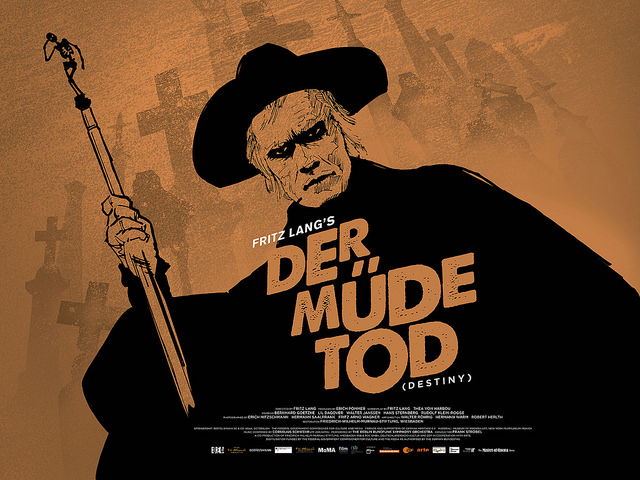
Dir.: Fritz Lang, Cast: Lil Dagover, Walter Janssen, Bernhard Goetzke; Germany 1921; 114 min; (Silent)
DESTINY is the first “real” Fritz Lang film: early films such as Die Spinnen, were still serial-cinema – but DESTINY was high drama with death as the focus – and the audience had to overcome fear before they could enjoy the lust for the dark netherworld: the Germans preferred death to life in the aftermath of WWI. Death was their destiny – or, as Kracauer put it, “the will of tyrants is fate”, not to be challenged.
In the prologue, a couple visits a small inn in an old town. The fiancé (Janssen) gets mysteriously lost, and the woman (Dagover), starts looking for him, but instead finds Death (Goetzke), who offers her three chances to be re-united with her lover in this life. In the first trial, set in Bagdad, Zobeide (Dagover), the sister of the Caliph, is in love with a commoner (Janssen), and her brother is so enraged by this, that he buries the suitor alive. In the second attempt, Dagover plays Monna, a Venetian noble woman who is in love with a middleclass merchant (Jannsen), but her jealous fiancée Gianfrancesco wants to kill the rival. Monna schemes to kill her fiancée instead, but at the Carnival, Gianfrancesco swaps costumes with Monna’s lover, and Mona kills him, instead of her fiancée. Finally, the third episode is set in Imperial China, where the Emperor asks the magician A Hi, to perform tricks for his birthday – warning him that he will be beheaded, if he, the Emperor, is bored by the performance. A Hi conjures up a miniature army, but the Emperor, though amused, wants to sleep with Tsien (Dagover), the magician’s female assistant. A Hi conjures up next a magical horse, but the Emperor wants to do away with Liang (Janssen), A Hi’s other assistant, who is Tsien’s lover. The two escape, but the Emperor has them caught and brought to his palace. Tsien repels the advances of the Emperor, and when A Hi arrives, she takes away the magic wand from him, and turns the guards into pigs. She than creates an elephant, freeing Liang from his cell, but the Emperor sets his archers on the fleeing couple, killing Liang, but sparing Tsien. In the epilogue, the young woman saves a baby, and Death would accept this life for the one of her fiancée, but the woman rather gives the baby back to her mother, not wanting somebody else to grieve like herself about the death of a loved one. Death takes her life, and she is reunited with her fiancée in the afterlife, after three failed attempts to save him
.
In “From Caligari to Hitler”, Kracauer devotes a whole chapter to DESTINY, and Lang’s next project DIE (1924). Fate, according Kracauer, has replaced any rational dealings with tyranny in Germany after 1918, and the work of Lang, particularly the Mabuse films and M, are symptomatic of this tendency to give in to suicidal/ homicidal tendencies. It should not be forgotten, that Lang’s co-writer, Thea von Harbou, had been a member of the NSDAP since the late 1920s and whilst not everything could be blamed on her (after all, Lang knew of her political standpoint – they were married), her influence did shape Lang’s films until his emigration in 1933. Kracauer saw how the tenets of German fascism could be detected in many of Lang’s films: the sub-conscious was much more powerful than any political organisation, because “the intrinsic action does not coincide with the succession of treacheries and murders, but is to be found in the development of smoldering instincts and I perceptibly growing passion. It is an all but vegetative process, through which Fate realises itself”.
A stylish silent film told with flair and a considerable amount of visual ambition thanks to the wizardary of Fritz Arno Wagner, Bruno Mondi and Bruno Timm. AS
DER MÜDE TOD (AKA Destiny) is as part of the Masters of Cinema Series in a definitive Dual Format (Blu-ray & DVD) edition on 17 July 2017.